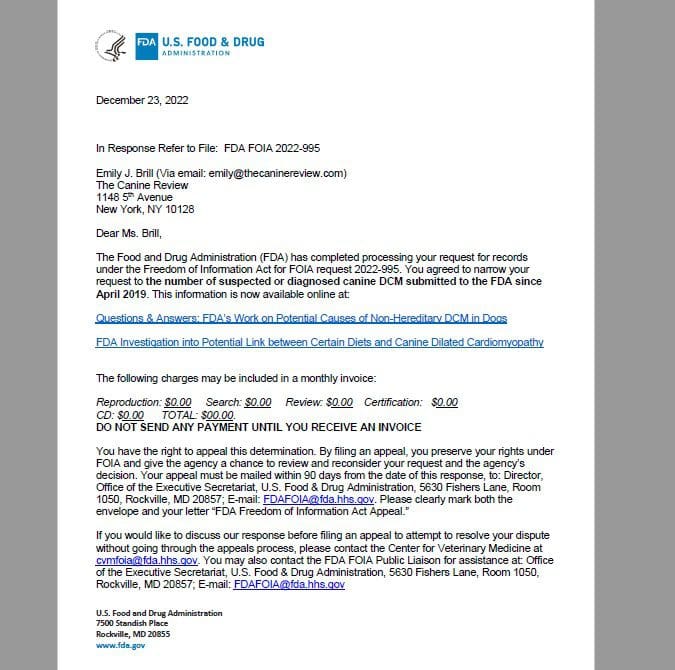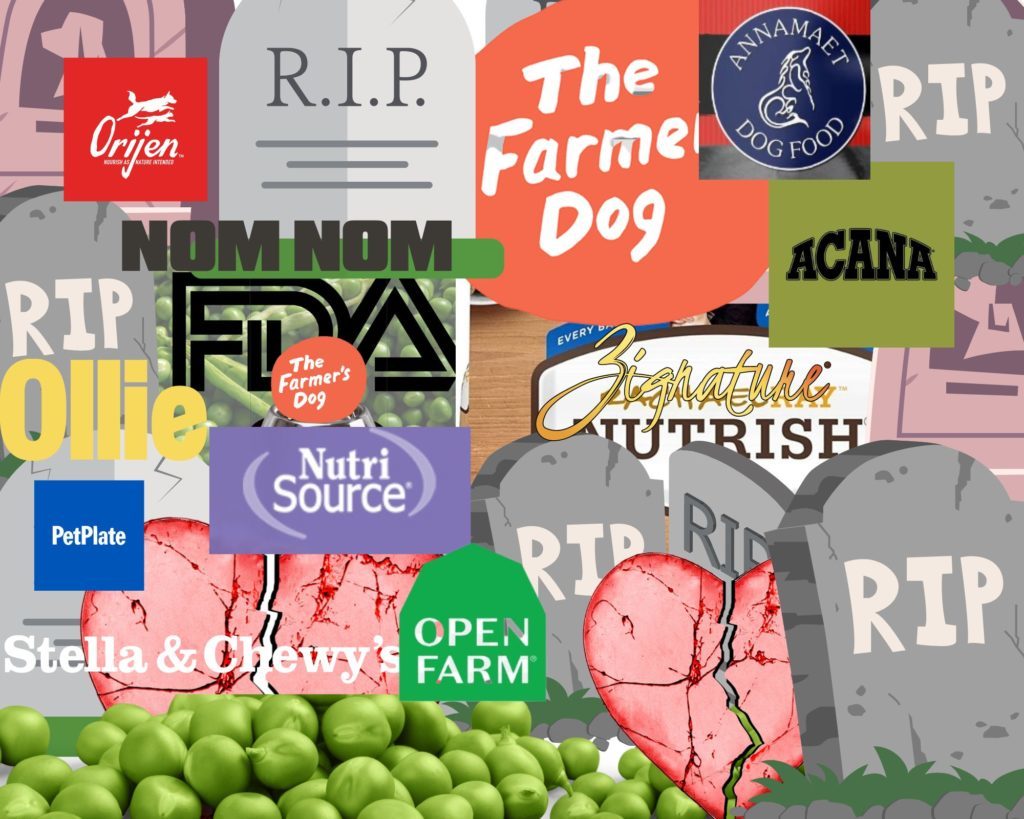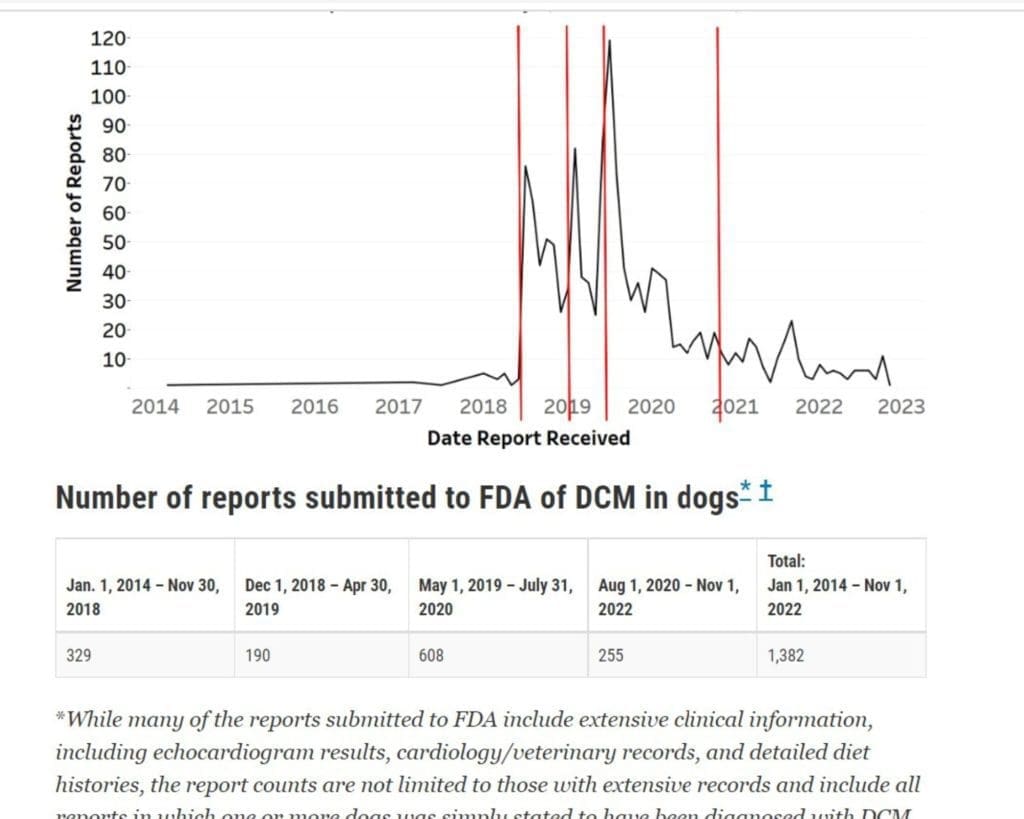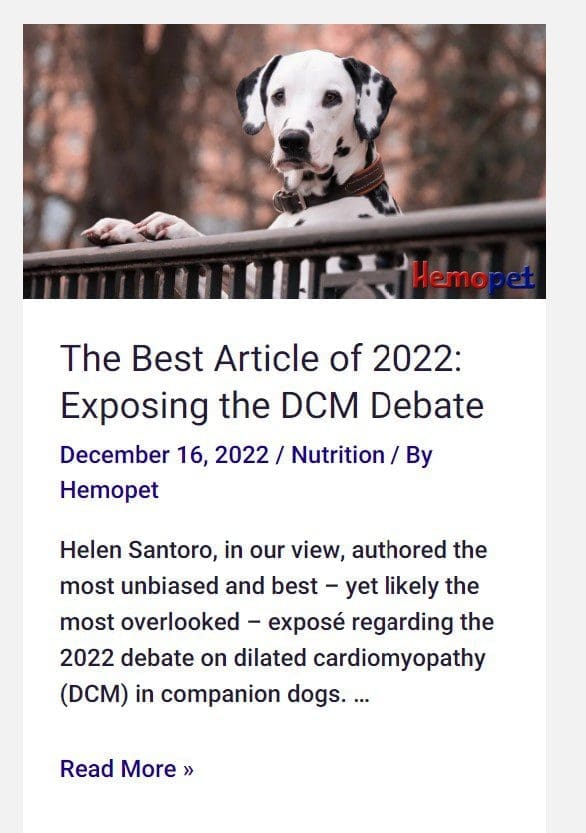FDA updates dog DCM case count for first time in years.
Case count now at 1382.
TAKEAWAYS
You may unknowingly be feeding your dog a diet that’s putting him at risk for sudden death. All dog breeds and ages are at risk.
- Discuss this 12/23/22 FDA update and new DCM research with your veterinarian.
Hours before Christmas Eve, in keeping with a Washington tradition of releasing embarrassing news when the fewest people are likely to notice, the U.S. Food and Drug Administration’s Center for Veterinary Medicine broke its nearly three years of silence on canine DCM (dilated cardiomyopathy), a fatal heart condition in dogs affecting the heart muscle that has been connected to certain kinds of commercial dog foods in recent years. For more than two years, The Canine Review has been seeking a single, basic piece of health information: the number of canine DCM cases, suspected or diagnosed, reported to the FDA since the last time the agency’s data was released.
255 new cases. 1382 total.
Making no mention of the real reason for the updated case count, which was TCR’s longstanding FOIA request, the FDA offered this explanation on its newly updated webpage:
It should come as no surprise that fewer pet owners reported cases as more time passed from when the FDA stopped alerting the public. Even the FDA acknowledges in a footnote to this new FOIA-generated report, “It is typical for FDA to receive a short-term increase in reports after issuing public updates on a pet health issue. In this case, upticks in the number of DCM reports to FDA tend to happen after FDA issues public updates on the DCM issue.”
Steven L. Rosenthal is a board-certified veterinary cardiologist and co-founding partner of a network of veterinary specialty hospitals in the mid-Atlantic called CVCA (Chesapeake Veterinary Cardiology Associates) Cardiac Care for Pets. He was among the group of highly regarded veterinary cardiologists who contributed early and significant research showing a connection between non-traditional dog diets and a deadly heart condition called DCM (dilated cardiomyopathy). When we asked him where he now assessed the science on DCM to be, he noted that one substantial challenge may be the fact that formulations of diets “continue to change on a daily basis.”
I believe there are continued evaluations of the effect of diet on cardiomyopathy, and there’s continued research to try to figure out the exact cause. That cause is difficult to find in part because the formulations of diets continue to change on a daily basis. So, because it’s a moving target of diets and formulations of diets, the incidence of disease is likely changed.”
Meantime, the FDA remains committed to silence, leaving a void for other information sources to fill for consumers.
The FDA’s Silence As Nutrition DCM Research Accumulates
“Anytime you leave something open for interpretation, it’s going to be interpreted a million different ways,” renowned veterinary nutritionist Dr. Jennifer Larsen of UC Davis told TCR in an interview in November 2020. “I think the FDA needs to be a little more explicit in their communications,” Dr. Larsen said. “Saying ‘we don’t know why’ doesn’t mean it’s not diet,” she added.
Saying ‘we don’t know why’ doesn’t mean it’s not diet.” -Jennifer Larsen, UC Davis
In 2020, FDA chief veterinarian Dr. Solomon, made what he apparently believed was a private vow to the pet food industry in Opening Remarks given to a conference at Kansas State University in September of 2020. The vow was that FDA CVM would not issue any more updates about DCM in dogs. The vow followed pressure that was applied by a group of farm state senate Republicans (and Democrat Jon Tester of the farm state of Montana) in a letter to then FDA Commissioner Hahn. The letter seems to have been the result of lobbying from the pulse industry — peas, chickpeas, lentils, and other ingredients that are often substituted for grains and/or proteins in “grain-free” dog foods — the same foods the FDA warned the public about in 2018 and again in 2019, but has since gone radio silent, for the most part.

The FDA has even updated the sub-section of the agency’s website dedicated to DCM. The FDA’s explanation for updating the data: “In December 2022 as part of a routine update to Congress, FDA compiled information on canine DCM reports submitted to the agency. FDA has opted to share that information here for public awareness.”
There is no mention of TCR’s FOIA request. Here is an email from the FDA’s press office sent in September which would appear to contradict the FDA’s claim that the data release is “routine.”
As we have previously stated,” FDA spokeswoman Anne Norris wrote TCR in an email on Sept. 20, 2022 responding to one of numerous reequests for a status update on our long ignored FOIA, “FDA isn’t planning to release an update or new numbers until there is meaningful new scientific information to share.”
The table that follows shows the number of reports of DCM in dogs submitted between previous public communications from FDA, up to November 1, 2022.
NUMBERS — 1382 Dogs With Broken Hearts Reported to FDA
Again, it should come as no surprise that less pet owners reported cases as more time passed from when the FDA stopped reporting on them, thereby allowing the FDA’s 2018 and 2019 warnings to fade. Even the FDA acknowledges in a footnote to this new FOIA-generated report, “It is typical for FDA to receive a short-term increase in reports after issuing public updates on a pet health issue. In this case, upticks in the number of DCM reports to FDA tend to happen after FDA issues public updates on the DCM issue.”
Jan. 1, 2014- November 30 2018: 329
December 1, 2018-April 30, 2019: 190
May 1, 2019-July 31, 2020: 608
August 1, 2020-November 1, 2022: 255 –> 1382
The FDA added an explanation to the numbers which seemed intended to minimize the significance of its own data:
In human illness investigations, FDA works in concert with the Centers for Disease Control and Prevention (CDC) and state boards of health, which collect and track cases of foodborne illness. Unfortunately, there is no equivalent for pets, which means that it is difficult to accurately evaluate the scope of an animal disease. For instance, FDA is unaware of any statistics on the background rate of non-hereditary DCM in dogs. Reports to FDA are voluntary and likely do not reflect the true incidence of the disease in the population.
FDA continues to encourage research and collaboration by academia, veterinarians, and industry. FDA reviews all reports received as part of our ongoing surveillance efforts related to pet food safety. However, due to resource constraints the agency is not able to follow up or provide updates on each report.
FDA: No, We’re Not Going to Name Brands
No, we are not planning to update the commonly reported brands, as we are aware that several pet food companies have adjusted diet formulations since our initial announcements about DCM. We have asked pet food manufacturers to share diet formulation information, which could substantially benefit our understanding of the role of diet in these cases. We continue to encourage pet owners to discuss their animals’ diets with their veterinarians.
Days before the FDA released the case count, we asked Dr. Rosenthal to guess what we would see.
“I can tell you from, from discussing with my colleagues,” he said, “at the end of the day when you’re working a 14 hour day, do you sit down and fill out a half an hour worth of forms for the FDA? So, you know, I believe the cases that are discovered and diagnosed….[but] when they do come in, they’re not as commonly reported.”
The Canine Review will now go back and demand that information in detail, including the brand names associated with the cases.
In the interim, we are calling on all impacted owners and vets to submit records to editor@thecaninereview.com so we can begin to compile the data while we fight to get the public record released.
Why The FDA’s Silence Has Been So Damaging
The FDA’s silence beginning in fall 2020 on canine DCM is problematic for two reasons: First, because the agency is withholding information that animal health professionals and consumers need and deserve in order to understand which foods are and are not safe. And second, because the void left by the FDA was subsequently filled by pet food marketing bloggers and, worst of all, even by journalists, many of whom were misled by a deluge of misinformation.
Which side of the story has undisclosed conflicts of interest?
AP outsources its reporting, becomes tool of pulse industry lobbyists who use journalism to discredit prominent veterinary academics and their research
In July 2022, the FDA got some back-up for its silence from the Associated Press, which published an ambush on veterinary academics who are widely regarded as leaders in their fields: veterinary nutritionists Jennifer Larsen and Lisa Freeman, as well as veterinary cardiologists Joshua Stern and Darcy Adin who have published groundbreaking research in an effort to pinpoint the link between DCM and some dog foods.
The story, headlined, “Did Industry Funding Influence an FDA Investigation into Canine Heart Disease and Grain-Free Dog Food?” answered that question this way: [A] tangled web of pet food industry funding and interests may have influenced the origin, data collection and course of the FDA study, according to an examination of internal FDA records and extensive reporting. A six-month investigation by 100Reporters has found that veterinarians who prompted the FDA to consider diet have financial and other ties to the leading sellers of grain-inclusive pet foods.”
The AP’s reporter on the story, however, was not an AP reporter. She was an outsourced ‘investigative’ journalist Helen Santoro of “100 Reporters,” a non-profit “investigative” news organization.
Asked through multiple email accounts and direct messages through social media to help us understand her reporting process and what she found Ms. Santoro declined repeated requests to comment. This is notable. When they publish important stories that purport to break new ground, reporters are generally glad to discuss their process and evidence, even if they are reluctant to reveal sources.
It was not irrelevant for Santoro to note this about one of the veterinary academics she pilloried: “[Dr.]Freeman has a long history of receiving funding from pet food companies including Nestlé Purina Petcare, Hill’s Pet Nutrition, and Mars Petcare….Over the past 20 years, she has been an author on studies funded by these pet food companies around 30 times.” However, as Santoro noted, Freeman clearly discloses that potential conflict. Moreover, Santoro, didn’t in any way outline which if any position did major food manufacturers Nestle Purina or Hill’s or Mars take that Dr. Freeman also takes or does not take. Answer: That would be impossible — because each company has pet food brands on both sides of the DCM debate. In fact, as we noted months before Santoro’s report, there is one industry with an unambiguous interest in keeping the FDA off the DCM trail: The farmers who grow the peas, lentils potatoes and other legumes, also called the “pulse industry,” that are the basis of grain free diets.
Emails and messages seeking comment sent through LinkedIn to leaders of the USA Dry Pea and Lentil Council were not returned. As we reported in February 2022, they even have their own trade association, The USA Dry Pea & Lentil Council. And their lobbyists have been deployed, apparently successfully, to apply pressure through Congress to get the FDA to stand down.
They also may have been deployed to influence Ms. Santoro. She quotes them seeking to delay any FDA findings on a link between pulse diets and DCM, and notes that they have pledged to donate funds for more research to “provide us all with guidance if and when a cause is determined.”
Ms. Santoro does not seem to be a fan of disclosure when it comes to her own activities. Her personal website indicates that she is available for consulting services, but when asked if there was any outside activity with which she was involved or is now involved that could have been affected by the DCM report, she again declined to comment.
Ms. Santoro also introduced us to a new animal health professional, Anna Kate Shoveller. The only information readers are told is that Dr. Shoveller is a professor of animal nutrition at the University of Guleph in Canada. What readers are never told, however, is that Dr. Shoveller is also the inaugural recipient of a Champion Petfoods grant (Champion produces ORIJEN and ACANA, both on the FDA’s killer 16 list) in Canine and Feline Nutriton. Also telling is the ecstatic reception Ms. Santoro’s reporting received by notorious never-before-licensed fake vet Jean Dodds:
“FINALLY, THE TRUTH
The Best Article of 2022: Exposing the DCM Debate
December 16, 2022 / Nutrition / By Hemopet
Helen Santoro, in our view, authored the most unbiased and best – yet likely the most overlooked – exposé regarding the 2022 debate on dilated cardiomyopathy (DCM) in companion dogs.”
FDA Forced to Break Silence On Canine DCM
After eleven months of FDA stonewalling, even declining to provide a status update on a Freedom of Information Request that The Canine Review submitted in February 2022, TCR sought assistance from attorney David Schulz who has successfully litigated some of the most high-profile media cases in recent history. While Mr. Schulz’s biography notes that he has “litigated issues concerning government secrecy in many contexts,” such as advising reporters on WikiLeaks, pursuing reporters’ access rights to basic health information about dogs which has already been released in three national warnings was a first.
FDA has now vowed to disclose the current dog DCM case count within six weeks. Hundreds of dogs and nearly three years have passed since the last update.
New FDA Data Coincides With New DCM Research
There is now a mountain of science pointing the finger at non-traditional dog diets. As of this month, twelve peer reviewed studies. In the new study, healthy adult dogs eating diets containing pulses (peas, lentils, chickpeas, etc.) as key ingredients showed heart damage as opposed to dogs eating grain-inclusive diets without pulses or potatoes in the top ingredients.
Of course, no agency wants to provide new data – in this case, the preventable deaths and illnesses of 255 dogs – associated with an issue that it has tried to stand down from acting on.
So, explaining why the FDA has been withholding the data to protect farm industry stakeholders [As more dogs die, pea lobbyists muzzle FDA; FDA continues information blackout of often fatal heart condition tied to dogs’ diets; in new statement, FDA says hundreds of dogs’ cases ‘not relevant’] whose sales of crops highly concentrated in foods were identified by the FDA in three major warnings in 2018 and 2019, had to be awkward. ” Thus, in responding to The Canine Review’s Freedom of Information Act request FOIA 2022-995, the agency discussed the delay in reporting new data this way:
In December 2022 as part of a routine update to Congress, FDA compiled information on canine DCM reports submitted to the agency. FDA has opted to share that information here for public awareness. ” – FDA explanation for updaing data
Latest science reaffirms deadly risk to dogs eating non-traditional, “whole” diets
With few exceptions, most board-certified veterinary cardiologists and nutritionists whom TCR has interviewed recommend these diets for any dog (as opposed to non-traditional diets, including but not limited to diets with high concentrations of pulse ingredients such as peas and lentils) because they adhere to rigorous quality control and safety standards set by the World Small Animal Veterinary Association Global Nutrition Committee:
- any grain-inclusive retail Purina, Hill’s, Royal Canin and,
- for non-UK/non-Europe members, IAMS and Eukanuba
- any prescription Purina, Hill’s, Royal Canin even if grain-free.
Only these five brands meet the WSAVA guidelines, including the requirement that food is tested by undergoing feeding trials. Please talk to your veterinarian as soon as possible about your dog’s diet.
The best source on your dog’s health is your dog’s veterinarian. Please consult him or her and discuss this article at your next visit.
What next?
Healthy Dogs Need to be Screened–Talk To Your Vet About This Article ASAP
If you are among the more than 120 million dog-owning Americans, you may also unknowingly be killing your dog as you read this. Here is the conclusion from the latest peer-reviewed research:
Again: The best source on your dog’s health is your dog’s veterinarian. Please consult him or her and discuss this article at your next visit.
Related Reporting
Related



